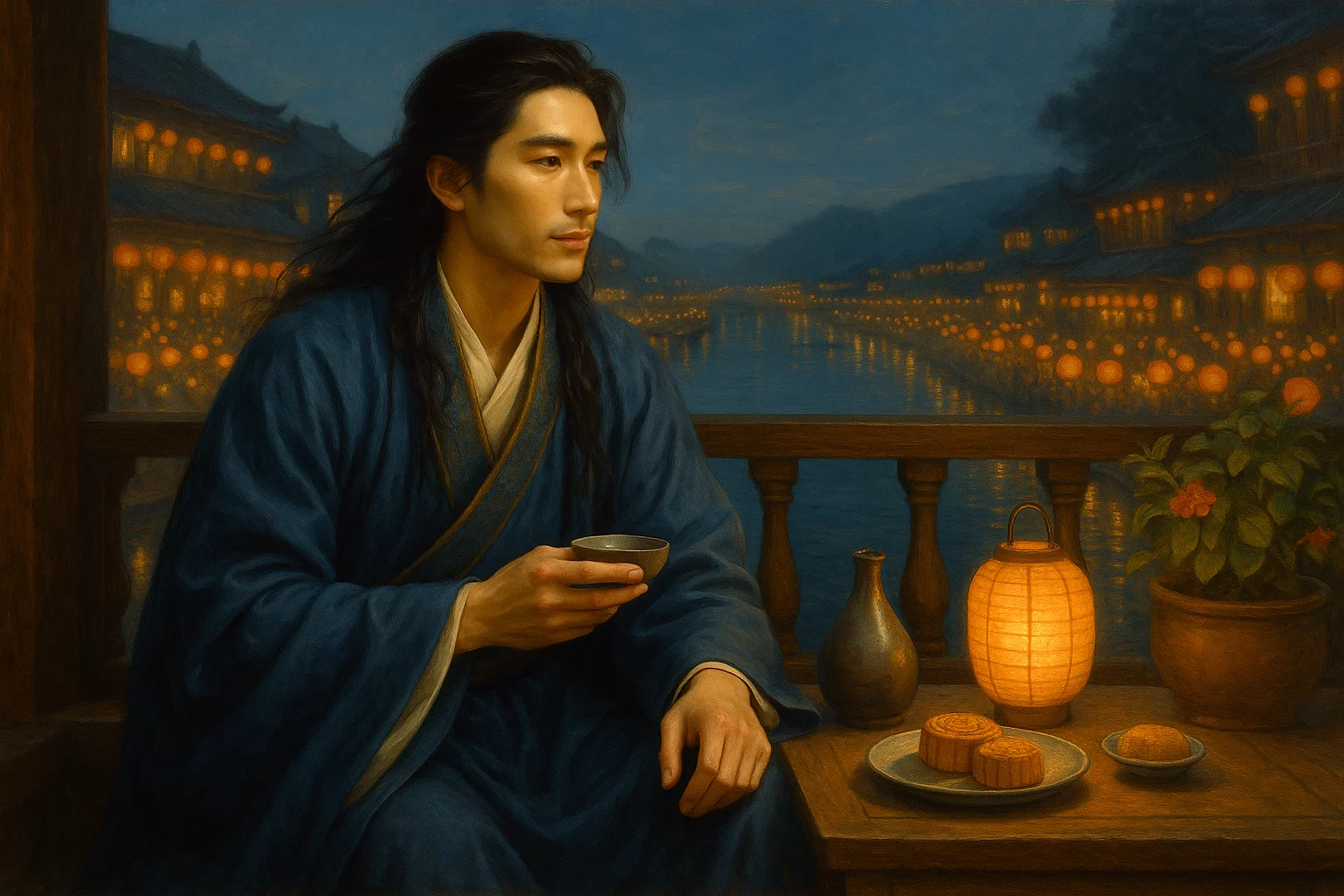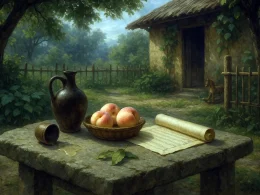Plum rains lift, summer winds rise,
Cicadas stitch sound through willow skies.
Pavilions frame far pool's prism—
Fish puncture lotus baptism.
Sheer gauze veils, swan-down fan,
Chilled pillow guards the cloistered zen.
Such weather, such ease—
A minor deity's lease.
Original Poem
「喜迁莺 · 梅雨霁」
梅雨霁,暑风和。高柳乱蝉多。
小园台榭远池波。鱼戏动新荷。薄纱厨,轻羽扇。枕冷簟凉深院。
周邦彦
此时情绪此时天。无事小神仙。
Interpretation
Composed during the Yuanyou era (1086-1094) of the Northern Song Dynasty, this ci poem emerges from a period of relative tranquility in Zhou Bangyan's official career. With his innate love for nature and refined musical sensibilities, Zhou crafted this work to capture the ambiance of summer after rain—a departure from his typically ornate style. Free from bureaucratic anxieties or sentimental sorrows, the poem celebrates a serene existence detached from worldly clamor, revealing Zhou's lesser-known capacity for simplicity and understated elegance.
First Stanza: "梅雨霁,暑风和。高柳乱蝉多。"
Méi yǔ jì, shǔ fēng hé. Gāo liǔ luàn chán duō.
Plum rains clear, summer breezes mild—
high willows swarm with cicadas' drone.
The opening establishes seasonal immediacy through meterological and biological markers. "Plum rains clear" (梅雨霁) signals the end of East Asia's rainy season, while "cicadas' drone" (乱蝉多) audibly confirms midsummer's arrival. The juxtaposition of "clear" and "swarm" creates a sensory paradox—visual clarity versus aural density—that animates the scene's vitality.
Second Stanza: "小园台榭远池波。鱼戏动新荷。"
Xiǎo yuán tái xiè yuǎn chí bō. Yú xì dòng xīn hé.
Pavilions overlook the garden pond's distant ripples—
fish frolic, tilting newborn lotus leaves.
Spatial poetry unfolds here—human structures ("pavilions") frame natural phenomena ("ripples"), while aquatic life animates botany ("tilting lotus"). The verb "tilting" (动) perfectly captures the transitive moment when fish become accidental gardeners, their playfulness transferring energy through the ecosystem. This stanza exemplifies Zhou's ecological gaze, where every element exists in dynamic relation.
Third Stanza: "薄纱厨,轻羽扇。枕冷簟凉深院。"
Báo shā chú, qīng yǔ shàn. Zhěn lěng diàn liáng shēn yuàn.
Gauze bed-curtains, feather fan's light sway—
pillows chilled, mat cool in the deep courtyard.
Transitioning indoors, Zhou constructs a thermal sanctuary. The "gauze bed-curtains" (薄纱厨) and "feather fan" (轻羽扇) embody refined heat mitigation, while "chilled" and "cool" (冷, 凉) map bodily relief onto domestic architecture. The "deep courtyard" (深院) suggests both spatial recess and psychological retreat—a haven from summer's intensity.
Fourth Stanza: "此时情绪此时天。无事小神仙。"
Cǐ shí qíng xù cǐ shí tiān. Wú shì xiǎo shén xiān.
This mood matches this sky—
carefree, a minor immortal.
The concluding couplet crystallizes Zhou's philosophical epiphany. The parallel structure "this… this…" (此时…此时…) forges an existential equation between inner climate and outer weather. "Minor immortal" (小神仙) playfully downgrades Taoist transcendence to an achievable daily state—not eternal sagehood but temporary respite from worldly entanglement.
Holistic Appreciation
This ci orchestrates a symphony of seasonal perception across four movements: atmospheric change (rain's cessation), aquatic theater (fish-lotus interaction), domestic thermodynamics (cooling strategies), and finally psychometeorological unity (mood-weather alignment). Zhou's genius lies in making the mundane transcendent—cicadas become nature's orchestra, fish turn performance artists, and a feather fan morphs into a philosopher's tool.
The poem progresses from macrocosm (sky, ponds) to microcosm (bed-curtains, pillows), mirroring the Confucian ideal of self-cultivation through environmental attunement. Unlike Zhou's typically elaborate compositions, this work achieves profundity through restraint—where "minor immortal" encapsulates an entire ethos of contentment in twelve strokes.
Artistic Merits
- Phenological precision
Zhou's observations—plum rain's cessation, cicada emergence, lotus leaf development—reflect Song dynasty naturalists' meticulous recording of seasonal signs. - Thermal poetics
The poem charts thermal regulation strategies from natural (breezes) to cultural (fans), private (bedding) to architectural (courtyard depth). - Ecological choreography
Fish "tilting" lotus leaves demonstrates Zhou's grasp of interspecies dynamics—an early example of environmental interconnectedness in poetry. - Existential minimalism
The concluding "minor immortal" redefines spiritual attainment as momentary disengagement rather than permanent transcendence.
Insights
Zhou's poem proposes that paradise resides in transient alignment—when "this mood matches this sky." His vision of summer contentment offers an antidote to modern productivity culture, suggesting that true luxury lies in unmeasured hours with feather fans and cool pillows.
The ecological mindfulness underlying the fish-lotus interaction speaks unexpectedly to contemporary sustainability ethics—recognizing humanity as participant rather than dominator in natural systems. Zhou's "minor immortal" ultimately models how to dwell poetically on earth: not through grand gestures but through daily attunement to rain's cessation, cicadas' chorus, and a pillow's perfect chill.
In an age of climate anxiety, this ci reminds us that resilience begins with noticing—that the first step toward planetary stewardship may be the same act that makes us "minor immortals": observing a fish tilt a lotus leaf, and knowing ourselves part of that delicate balance.
About the Poet

Zhou Bangyan (周邦彦 1056 - 1121), a native of Qiantang (modern Hangzhou, Zhejiang), was the culminating master of the wanyue (graceful and restrained) ci poetry of the Northern Song Dynasty. A virtuoso in musical temperament, his ci are renowned for their opulent refinement and technical perfection. He created dozens of new melodic patterns (cipai) and adhered to strict tonal rules, earning him the title "Crown of Ci Poets." His influence extended to Southern Song masters like Jiang Kui and Wu Wenying, establishing him as the founding patriarch of the Rhymed Ci School.












